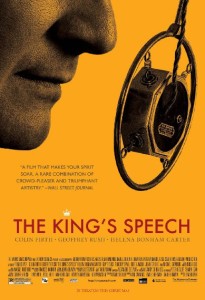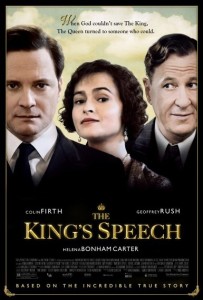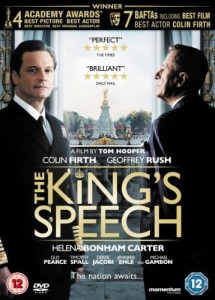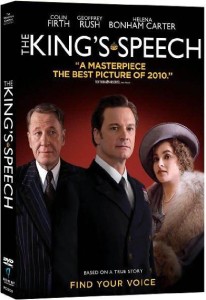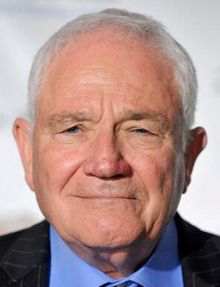The King’s Speech ***** (2010, Colin Firth, Geoffrey Rush, Helena Bonham Carter) – Classic Movie Review 3,311
A whole film about stuttering? Well, put that way, maybe not, thank you. The King’s Speech is, well, rotten. But not the movie, his actual speech. The movie’s astounding. So absolutely, yes please!
It’s the Thirties, live radio (the wireless) has just become a must, and Prince Albert (or Bertie) can’t make a speech. The future King George VI just stutters and stammers like an idiot. After failed visits to various idiot therapist, he has more or less given up and his wife, the future Queen Mum, is at her wit’s end till she visits Aussie eccentric speech therapist Lionel Logue and talks Bertie into going along.
This totally unpromising idea for a film produces an instant classic on a par with The Queen (2006), thanks to a superb script, as moving, witty, clever, informative, historical, dramatic and simply plain darned funny as you could ever imagine or hope for. We’ve got used to actors in Brit movies being good – at least when they’re allowed to be. Here, they’re whatever word describes the next level up from magnificent – is that monumental?
The three stars are all chasing Oscars. A man inspired, Colin Firth even out-does his Oscar-nominated turn in A Single Man, as profoundly touching as he is effortlessly amusing. Helena Bonham Carter offers brilliant support: eccentrically warm and funny, she proves that no other current actress could have even been considered to be cast as Queen Elizabeth.
Yet Geoffrey Rush is not to be outdone by these two. His support is showy, scene-stealing stuff of right royal quality. Any ordinary actor would have been wiped off screen by Rush. Firth’s performance is only enhanced by Rush’s, with both actors using the other, striking sparks off his opponent to lift their games. Set and match, then, to The King’s Speech.
Other than that, I’m speechless. No, one other word. The future king is encouraged to swear by his therapist: the film was originally rated 15 for 17 uses of the F-word but finally became a 12, with a warning ‘Contains strong language in a speech therapy context.’
In the event, it won four 2011 Oscars, Best Motion Picture of the Year, Best Performance by an Actor in a Leading Role (Firth), Best Achievement in Directing (Tom Hooper) and Best Writing, Original Screenplay (David Seidler). There were eight other nominations, and it’s a huge shame that Rush and Carter didn’t win Best Supporting Performance awards.
Firth also won the Golden Globe for Best Performance by an Actor in a Motion Picture – Drama. It was popular at the Baftas, winning seven, including Best Film, Best British Film, Best Leading Actor, Best Supporting Actor, Best Supporting Actress, Best Screenplay (Original) and Best Music.
David Seidler (4 August 1937 – 16 March 2024) won the Academy Award and a BAFTA for Best Original Screenplay for The King’s Speech.
Oscar-winning screenwriter David Seidler died aged 86 on 16 March 2924 in New Zealand doing what he most loved – fly-fishing. He drew on his experience growing up with a stammer from the age of three, and dedicated his Oscar to ‘all the stutterers around the world’ – and thanked the Queen for ‘not putting me in the Tower for using the F– word’.
He started research on The King’s Speech story in the 1970s when he discovered the Queen Mother had hired Australian speech and language therapist Lionel Logue to help her son, and then more seriously in 1981 after finding Logue’s surviving son, Valentine Logue, a brain surgeon. Logue was keen to co-operate with Seidler, but only if he received permission from the Queen Mother. But she asked him not to pursue the project during her lifetime. She died in 2002, and Seidler started work on the project until three years later.
Seidler was born in London, resettled in America, and grew up on Long Island, New York. He arrived in Hollywood at the age of 40, writing Tucker: The Man and His Dream for Francis Ford Coppola.
Seidler had originally conceived the story as a stage play and the success of the film encouraged producers to bring it to the stage as originally intended. Seidler’s 2012 play version of The King’s Speech was staged at the Wyndham’s Theatre in London’s West End from 27 March 2012 to 12 May 2012.
© Derek Winnert 2016 Classic Movie Review 3,311
Link to Derek Winnert’s home page for more reviews: http://derekwinnert.com/

